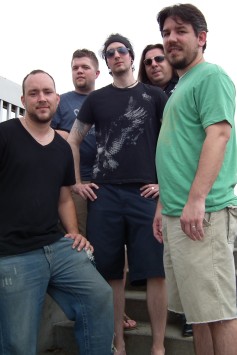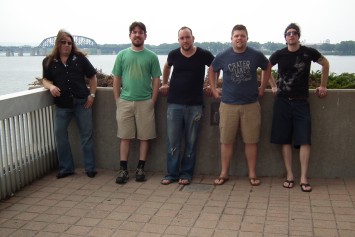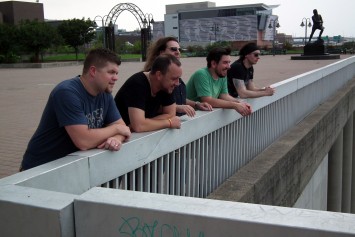social bookmarking tools:
 |
|
| Available RSS Feeds |
|---|
 - Top Picks - Top Picks |
 - Today's Music - Today's Music |
 - Editor's Blog - Editor's Blog
|
 - Articles - Articles
|
Add Louisville Music News' RSS Feed to Your Yahoo!
|
Sub-Urban Situation Finds the Right Musical Marriage
Patrick Wolfe noted that being in a band is like being in a marriage, with the exception that it's with three or four other people instead of just one.
The Sub-Urban Situation lead guitarist would know – he's currently been married to Sub-Urban situation for eight years or better. Luckily, the seven-year itch came and went without so much of a hiccup, and the band recently released it's second full-length album (and third release all together), Lost Melodies.
"The decisions the band makes as a whole musically aren't always what each individual would necessarily decide," Wolfe said, talking about the album, "but I think everyone contributed what they wanted to contribute.
"I thnk it's the best album we've done to date. It's accessible – some people don't like to use that word, but I don't thing there's anything wrong with that."
The band members may not always agree upon everything – like in any marriage – but one thing they do seem to agree upon is that each member of the band brings an original signature with him, creating something with true gestalt.
The term the band came up with for its sound – alternative R&B – becomes more meaningful after hearing a few songs from Lost Melodies. Wes Neidiffer's vocals are truly the stuff of modern rhythm-and-blues, but laid over what sounds almost like light progressive rock with infusions of pop, jazz and even folk.
Of course, "accessible" is in the ear of the beholder, and one thing remains true – Sub-Urban situation's image may not exactly belie its sound.
"We get a lot of people who haven't heard us that say, 'That is not at all what I expected you to sound like," said bassist Vinnie Flick.
"I'm sure it's hard for anyone to visualize how awesome we are," Wolfe deadpans. And since the CD is brand new, the Sub-Urban Situation guys are anxiously awaiting the response Lost Melodies will get from the public.
"I think any listener that gets hold of the album is going to be able to dig into some part of it," Wolfe said. "My mom? She loves it so far.
"My mom, too!" Flick adds.
"Of course," Wolfe then says, "I could probably hit an open E string and she would say, 'That's really pretty.'"
"What's so cool," said Neidiffer, "is that every person brings their own genre to the band. I think this album is probably the most mature in terms of reflecting the genres we listen to."
"We definitely put more energy into arranging and production on this album," Wolfe said. "Usually, I'm kind of a bitch in the studio; I just come in and play my guitar parts and leave. 'I'm gonna ice the cake now. I'm done, peace.'"
But Wolfe likes the technical aspect of recording, and Flick admitted that while recording can be hard work, he enjoys the studio experience. They believe the end product speaks for itself.
"Patrick and I were very focused on the structure of things" during the recording process, Flick said. "Making sure all the gaps were filled in, then sitting back and listening to it with very attentive ears. For example, on 'Lie to Me,' during the pre-chorus, there is a guitar part that I added in because I wanted it to have a harder sound. We ended up deciding to keep it."
The band members seem to almost universally point to "Lie to Me" as the album's strongest track, followed closely by "Uma Melodia Perdido." "Lie to Me" is a smoldering ballad with an edge, and actually appears twice on the CD – once as a fully-produced track, and once as a stripped-down acoustic version of the song.
"Uma Melodia Perdido" is a sprawling, slow-burning track flavored with a soulful Neidiffer vocal delivery that blends modern R&B with '70s pop influences.
This one is Tripure's favorite track, for several reasons. "It is close to my heart," he said. "My wife, Fernanda, helped name it -- she is from Brazil, and the title means, "a lost melody" in Portuguese -- and it is different from almost any song we have written before.
"I had the whole idea of the dynamics of the song before I ever showed it to the guys. I just think the chords sound amazing all put together and, even though it is an eight-minute song, it never seems that long when I listen to it. I guess it is like our 'Stairway to Heaven,' even though I am not claiming Sub-Urban Situation and Led Zeppelin are on the same level by any means."
Then there's "Indiana Summer Night," which is a throwback to the band's early days, and "Wanted Man," which has a bit of a southern rock flavor.
All in all, the album oozes charisma and reflects the time and care that was put into its recording. Like with a successful marriage, clearly s was nurtured and adjusted until the right balance was reached. And while there was a plan going in, there was natural improvising based on what each day presented.
The album was engineered by Billy Bartley at Downtown Studios in Louisville, and mixed/mastered by David Barrick (Black Stone Cherry, Kentucky Headhunters, Flynnville Train) of Barrick Recording Studios in Glasgow, Ky. Yes, that's the bottom line, but it was more than just showing up and playing the songs.
"When we were tracking this album, they had a Yamaha baby grand sitting in the studio, and we said, "We have to use this," Flick said. So they did. Occasionally, Neidiffer will play keyboards on stage, but the songs have not been written for piano. But that baby grand appears on a number of the tracks.
"We evened tuned the drums to the key of each song," Flick said. And while the basic music tracks were recorded over the course of a weekend, Neidiffer and rhythm guitarist Greg Tripure spent even more times tracking vocals at Neidiffer's home studio. The album was more than a year in the making, once all was said and done.
DIY
All the work does have a purpose beyond just the love of music. Of course, it's the love of the music that comes first.
But Sub-Urban Situation has toured the Midwest and eastern United States for the last few years, and they've opened for a number of high-profile artists: Devon Allman and Honey Tribe, Sister Hazel, Perpetual Groove, The Phunk Junkeez, Paradime, Ana Popovic, The VilleBillies, Nappy Roots, Spike Davis (Comedian) and many more.
Another significant accomplishment for Sub-Urban Situation was being voted into the WFPK 91.9 fm Louisville's "Virtual Hall of Fame" alongside artists including My Morning Jacket, John Butler Trio, Ani DiFranco, and Robert Randolph and the Family Band.
They've been around in the last eight years or so. So, what's next?
Well, it isn't really fame they are looking for, but they are hoping to garner a measure of recognition – and the plan is to attempt to do so by way of pitching their music for licensing in film, television and the like.
"The industry has changed so much the last ten years," Neidiffer said. "I think we are a good band for motion pictures and that kind of stuff. The band went from 'Let's get signed' to 'If we can do this on our own, let's do it.' With the internet, you can pretty much do anything; I just want people to hear us, that's the bottom line – not necessarily to be famous or anything like that."
"We are trying to attract some sort of national attention," Flick concurs. "I don't know if a label is where we would want to go with it. We want to look into television and film licensing. In this day and age, I'm not sure if a record label can do anything for you that you can't do yourself. I'm not even sure physical distribution is all that important anymore. Besides, we can't all be Katie Perry and make all the money."
Plus, Sub-Urban Situation is no longer quite the right age to be the next rage – that honor is typically bestowed upon younger artists.
"I guess the age I'm at now, I know the odds," said Neidiffer. "But I believe we have enough talent that we could at least make a splash. Everybody's got their jobs and kids, but I think we can put something out that can rival what's out there nowadays."
Tripure concurs, saying that the band is a bit more "selfish" after years of performing and recording together. "If people like our music, great," he said. "If they do not, that's cool too, but I think as long as we go out and play our music the way we feel it at that time, that is the most fulfilling nowadays."
Not being under pressure from a label also offers flexibility to do the job right and, to Tripure's point, the way the band wants it done. Flick said four months were spent just getting the artwork finalized for the album. While the basic tracks were recorded over a long weekend, Flick estimated that Neidiffer probably did 30 vocal takes per song in order to get just the right sound.
FROM WHENCE IT CAME
The journey has been a fun one, and it has taken some interesting turns. Like with many bands – Spinal Tap, anyone? – a number of drummers have come and gone, and in the band's early days, they worked with a couple of rappers.
Some tracks on the first album feature rap elements, reflecting a time when the band was trying to consciously incorporate hip hop into the songs. Interestingly, however, the project actually started as an acoustic trio with Neidiffer, Wolfe and Tripure.
Neidiffer, at that point, just wanted to sing. He had done some a cappella singing, and also was influenced by his mother, a gospel singer.
"I grew up in church singing," he said. "I would go to a lot of Baptist choir stuff and learned a lot from that."
He was also influenced by rock music growing up, but his singing was inherently rhythm and blues, and his mother's gospel singing "is what brought that aspect of music to me."
The acoustic beginnings of Sub-Urban Situation were born through Neidiffer and Tripure, who went to high school together, and there was little thought at that time to what the future might hold, musically.
"Starting like that, I was more or less just enjoying the music," Neidiffer said. "I think the acoustic portion was more of a singer-songwriter type thing, and that's what elevated us, writing-wise."
Wolfe joined next, more or less by accident.
"I used to hang out with some people at K-Dogg's recording studio," Wolfe said. "I was over there playing Playstation, and Wes and Greg walked in and said they needed someone to play guitar on [a track]. I said, 'I'll do it.'"
"Wes and I started out as an acoustic duo," Tripure said. Wes was doing hooks for his then hip-hop trio Triple Crown. I was doing my solo singer-songwriter thing; we got together and started writing. We met Pat in a happenstance moment at a studio. The first day we met, he heard a song of ours and laid down some lead guitar for us. We keep in touch, and a few months later, we did a show together where he [Wolfe] only had like a day or so to practice the songs."
And then there were three, and things started to pick up steam.
"We were doing lot of writing then," Wolfe said, "and kind of hatching some of the songs that later were on the first and second album."
Flick met his future bandmates when he was promoting shows around town and hired them as openers. Flick had played bass in the band Four previously.
"I told them, 'You're doing this R&B thing, you should get a bass player'" Flick said. "They said, "Would you be interested?' I said, 'I didn't necessarily mean me.'"
Drummers then came and mostly went. Richard Vier, formerly of Waterproof Blonde, filled the drummer's seat for a while, but eventually moved to Florida. He played on the band's second release, The City EP. After he left town, Joseph Poff took over and has since remained.
LOOKING AHEAD
Sub-Urban Situation is happy where it is, but nevertheless wants to move forward and continue to tour when possible. Domestic responsibilities will come into play, but nevertheless, performing live is the band's milieu. And Neidiffer takes pride in the fact that his band represents so well on stage. No tricks, no auto-tune – just music.
"Nowadays, it's so easy to make someone who can't sing into a singer," he said. "People say to us, 'You sound better live than you do on the CD.' To me, that's the ultimate compliment."
He then told the story of some high school friends who moved to New York; he went to visit them around the time Britney Spears was at her height of fame, and it turns out she had recorded in Neidiffer's friend's studio just two weeks earlier.
"He said, 'Let me play this for you real quick,'" Neidiffer said. "He cut all the music out and then cut her voice out -- there was, like, 10 seconds of singing, and the rest was computer generated. That's when it hit me: 'Damn, anybody can do this.'"
Performing live is the thrill of any (legitimate) musician, and the road offers its own unique rewards. In one story from New Jersey, Flick tackled a toy plastic house on the lawn of some unsuspecting resident. Tackled it to the ground, in fact – completely leveled it.
"When we went by there again just a few hours later, it was back together," Wolfe said. "Whoever their maintenance man is deserves a round of applause."
And then there is the sign-stealing. Sub-Urban Situation's fetish is stealing signs. Any kind of signs, from businesses to street signs. There are good stories there, as well, but they probably do not belong in print.
And then of course, there are the shows. The band loves playing, so they play.
"I hope we can tour again," Tripure said." I love the road. If I could make music, travel the world, and support a family, that would be great. … Just waiting for gas prices to go down!"
Fuel inflation notwithstanding, Neidiffer is confident Sub-Urban Station will get back out on the road later this year.
"I think everybody still has the heart to do it," he said. "We've been together so long, [but] I think its something that is worthwhile to everybody."
Sounds like a marriage made in heaven.













